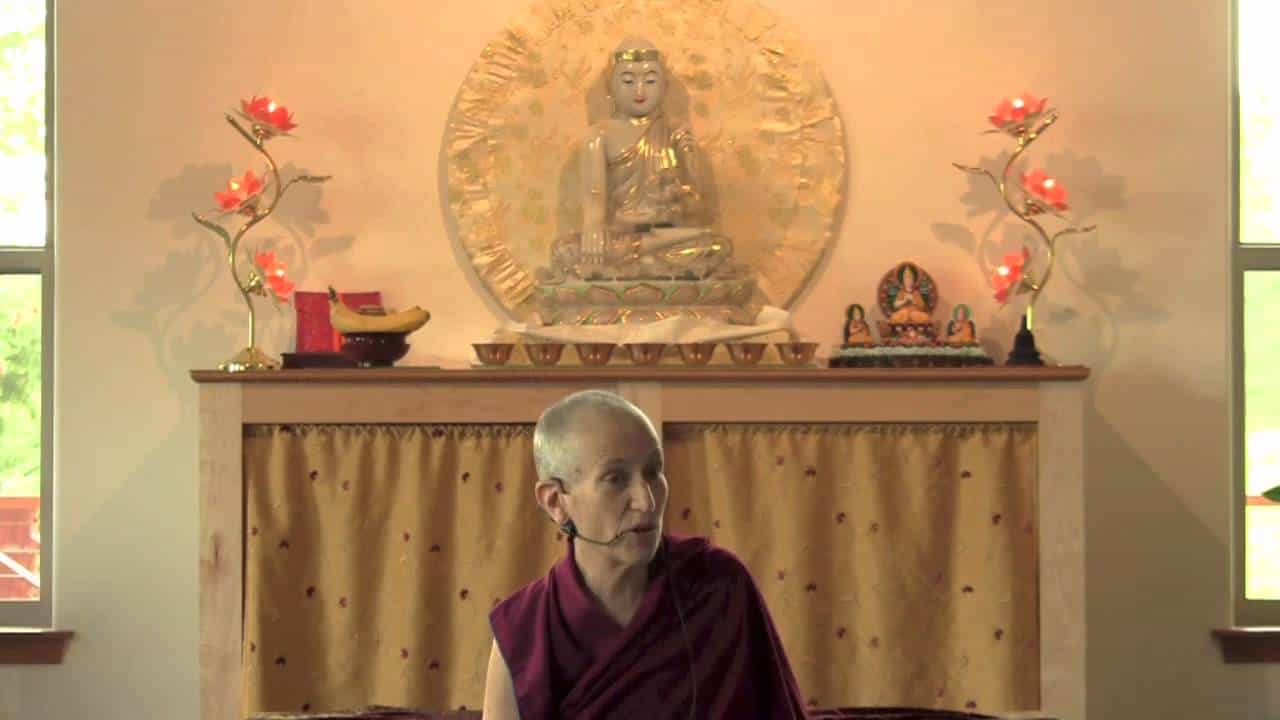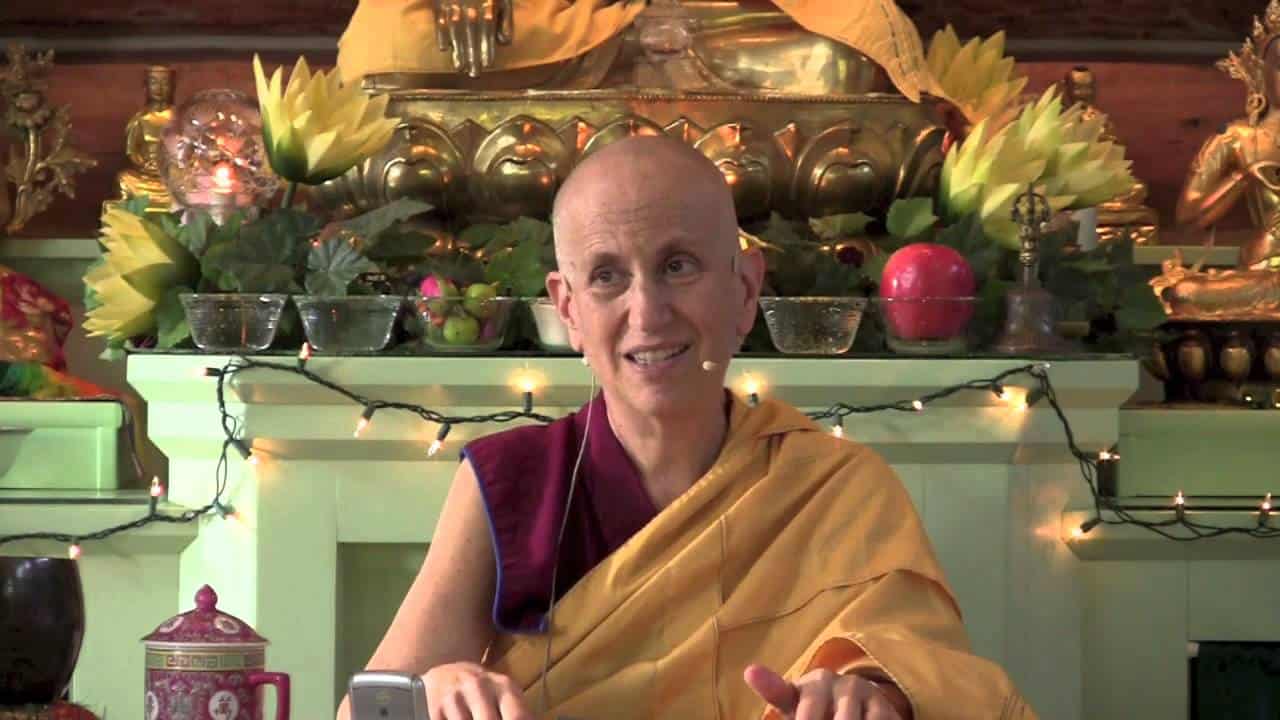Verse 101: The magical horse
Part of a series of talks on Gems of Wisdom, a poem by the Seventh Dalai Lama.
- Three types of joyous effort
- Methods to increase joyous effort
- The importance of bodhicitta
- Putting the teachings into practice ourselves
Gems of Wisdom: Verse 101 (download)
Who is the magical horse able to go wherever reined?
Someone with joyous effort that tirelessly completes every undertaking.
So we talked about it last night, you can’t escape it. So we’re going to review the three kinds of joyous effort:
-
Armor-like joyous effort which enthusiastically engages in things with a lot of confidence and a lot of good energy. That’s kind of the way we want to live our lives, isn’t it? We don’t want to live our lives just dragging along…. You want to live it with some kind of joyous energy and enthusiasm for whatever you’re doing.
-
And the second one is to create wholesome actions.
-
And the third one, to benefit sentient beings.
All three of these need to be undertaken with bodhicitta. And I think, when you think, what increases your joyous energy?
So last night [Easy Path teachings] we talked about the three kinds of laziness and how to overcome them, and then we talked about the four factors…. Aspiration (or interest) and belief. What was the second one? Third one was joy, fourth one was rest…. Steadfastness, or stability.
-
And then steadfastness, to complete what you set out to do.
-
Joy, which also has to do with completing it and feeling satisfied with what you do.
-
And then resting after you’ve completed something so that you can rejuvenate your energy and go on, again, with enthusiasm.
In thinking about all of these, you know, those four are specific methods to increase your joyous effort, but I think bodhicitta is really the thing behind the whole works. Because if you don’t have bodhicitta then there’s really not much joy in life. Because if we’re just looking for our own pleasure you can get a certain amount of enthusiasm for a while and then the kind of worldly pleasure you get doesn’t keep going, it ends after a while and that’s why people wind up in mid-life crises. It’s like “I’ve done all this my whole life and now what? What do I do now?” And there’s a crisis. Where do they find their joy? Where do they find their meaning?
Whereas when you have the bodhicitta, the aspiration to attain full awakening to best be able to benefit sentient beings, then you’re always excited about what you do because you’re doing something really good. And even if you don’t succeed at first you keep going. Whereas without bodhicitta if we don’t succeed to fulfill our wild expectations, or even our modest ones, then we just kind of throw up our hands and say, well, no use. But with bodhicitta we keep on going and eventually we are able to accomplish what we want to accomplish. It may or may not be in this lifetime, but … so much of our problem, I think, is that we give up on ourselves. And we just say, “Oh, I have this problem, I have this hindrance, I have this difficulty, so there’s no use trying.” And we just give up on ourselves and don’t try. And what’s more, we don’t even take the hindrance into the path, whereas if you’re practicing thought training, okay, you have a hindrance, then you think “it’s my karma ripening, this is good, now that’s karma being cleared, so I’m going to be able to go ahead now with more enthusiasm and with more ease,” you know? So you change your mind in some way so that you can go forward with a good attitude. But when we just give up on ourselves and we don’t practice thought training, even when we have hindrances, then [shrugs, sighs]. And who wants to live like that?
It’s up to us. It’s up to us, really. Remember I told you the story last night about how the professor really examines people to see how they do when they don’t succeed. And that’s really, in one way, the test of what’s going on with the person. Because we’re all going to face situations in which we don’t succeed in fulfilling our expectation–either because it was a wild expectation, or even a modest one, because there are hindrances that come up–this is totally normal in samsara that this is going to happen. So then what do we do when it happens? Do we just give up? Do you go to the pub? Or sit there and space out on watching movies on the tube, or on the computer? Or do you put the Dharma to work in your mind and keep going?
So again, it really depends on us. Nobody else can crawl inside our mind and change our attitude. Nobody else can do it. We have to do that ourselves. So we can listen to advice and we listen to teachings, but we have to apply the to our own mind. Just listening to them is not going to do it.
We all have unruly, difficult minds. That’s the definition of being in samsara. Being an ordinary being in samsara. So what else is new? You think you have more hindrances than everybody else? That’s not true. So we just have to deal with whatever is, and remember our bodhicitta, and go on. And in that way we can create a lot of joy and enthusiasm in our lives. And it builds on itself. Okay?
So, comparing ourselves to other people? Seeing where we stand on the list of big successes? Useless venture. Totally useless. Better just to be where we’re at and practice and go ahead, with a happy mind. Okay?
Venerable Thubten Chodron
Venerable Chodron emphasizes the practical application of Buddha’s teachings in our daily lives and is especially skilled at explaining them in ways easily understood and practiced by Westerners. She is well known for her warm, humorous, and lucid teachings. She was ordained as a Buddhist nun in 1977 by Kyabje Ling Rinpoche in Dharamsala, India, and in 1986 she received bhikshuni (full) ordination in Taiwan. Read her full bio.


